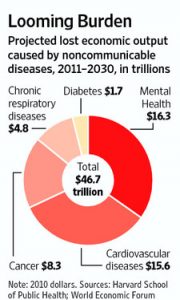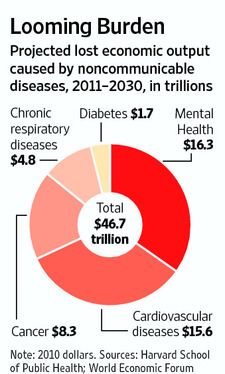Today and tomorrow (July 10-11), world leaders from government and civil society are meeting at the United Nations to discuss future directions to combat the worlds biggest killer: chronic diseases (cancer, heart disease, chronic obstructive pulmonary disease, diabetes, and mental illness).
Chronic diseases do not discriminate between rich and poor, and they severely hamper economic growth. Still, prevention efforts and country action against non-communicable diseases (NCDs) have grossly lagged behind that of infectious diseases such as HIV/AIDs.
This inaction at the global level is a prime example that high level knowledge, expert advice, and calls to action fall short in creating change. If no radically new and innovative solutions are proposed, and all stakeholders are not at the table, there seems little hope that this years UN meeting will result in more tangible results than the UN High Level Meeting on NCDs in 2011.
However, several promising ways to overcome this lack of action are emerging, both in developed and developing countries.
For developing countries, Development Impact Bonds (DIBs) hold great potential to compensate for decades of low funding towards NCDs from donors, governments, and the private sector. Measurable and financial gains from NCD prevention are sometimes seen only 20-30 years post-intervention, longer than a politicians time horizon or a traditional donors funding cycle. With DIBs, donors or investors stand to gain financially if lives are saved and productivity increases. Investing in NCD prevention can thereby become profitable, as long-term return on investment for cost-effective interventions have already been proven.
For workplace health and well-being programs, in developing and developed countries alike, if health insurance premiums are in part paid via employers, health care costs and hospital stays can decrease within few years of a successful program. Our recent report highlights how including health metrics in corporate reporting could help make companies accountable for employee well-being and redirect investment towards companies with a focus on employee and population health.
Overall, in order to attract much needed investments to NCDs via these new channels, increased public-private collaboration, cross-sectoral trust, and guiding standards are needed. In the past, the UN raised the importance of human rights in business practices via the UN Guiding Principles on Business and Human Rights. Hence, will a UN-affiliated body whether the UN, the World Bank, or UNDP step into the NCD leadership vacuum and play a critical role in guiding and harnessing public-private cross-sector collaboration to build on the strengths of different stakeholders?

Andrea Feigl is doctoral candidate at Harvard School of Public Health and a summer research fellow with the Vitality Institute. Follow her on @DanceDok and the Institute at @VitalityInst.







